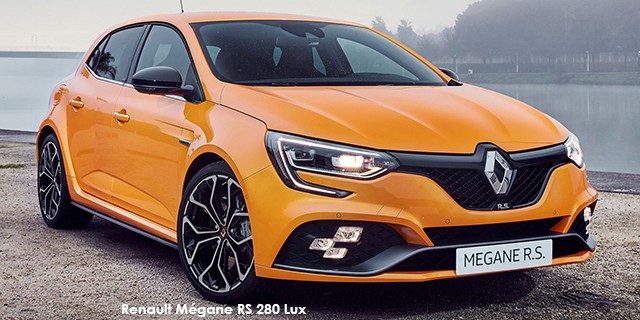As the “Lux” in its name implies, this new Mégane RS could finally offer some real-world usability. Or not...
Have there really been only three generations of the Mégane RS? First brought to market in 2004, the most focused version of the second-generation Mégane not only introduced the hot hatch fraternity to the Dieppe-based RenaultSport department’s black-magic handling wizardry, but also placed immediate pressure on every other fast front-wheel-drive rival to up their game.
That pressure would prove relentless as Renault made the most of both its links with Formula One and a desire for continued segment success by launching myriad special editions and limited-run Mégane RS models, each boasting stepped-up performance and further-evolved handling characteristics. It culminated in the sharpest of all with the second-generation Mégane RS line-up and the RS 275 Trophy that claimed the Nürburgring Nordschleife lap record for a front-wheel-drive car.
While track-based successes and lap records certainly do wonders for reputation, they don’t always translate into sales volume. As much as there may be an occasional boy racer in every driver of a warm hatch, the needs of everyday motoring life, including occasionally taking your mom to the shops, inevitably dictates just how focused your hatchback can be. It’s within this careful compromise where Volkswagen has enjoyed so much success with its Golf GTI.
At the heart of each Mégane RS line-up has been both carefully considered performance outputs as well as honed suspension configurations, distinguishable via Sport, Cup or Trophy designations. While the hardcore Trophy version of the newest, fourth-generation Mégane was recently announced, until that variant arrives, Renault South Africa will offer both this Sport (dubbed Lux in our market) and its Cup sibling.
Topping a recently reprofiled local Mégane line-up, the new RS models are instantly recognisable from the three remaining, less-powerful derivatives via a suitably wider stance (60 mm up front and 45 mm at the rear) complete with vent-riddled wheelarches, bespoke front bumper (including an “F1-inspired” blade diffuser and slightly gimmicky RS Vision fog lamps) and a centrally mounted exhaust tailpiece housing.
Indeed, even without the optional Tango Orange paintwork applied to our test unit, there’s no escaping the sense of purpose handed to even this, the “softest” Lux model. While 18-inch alloy wheels are standard fitment to this derivative, an upgrade to the Cup’s 19-inch items (as seen here) is also available. The Cup remains distinguishable via its slightly lower stance (7 mm) and red brake callipers. RenaultSport interior upgrades include deep bucket seats, chrome and carbon-look trim bits, bespoke infotainment system displays and a generously moulded steering wheel.
Priced identically, both RS models feature Renault’s new turbocharged 1,8-litre engine mated with a six-speed EDC (dual-clutch) transmission in the Lux and a six-speed manual ‘box in the Cup derivative. Boasting 205 kW and 390 N.m of torque, the prevalence of wheel spin off the line – even when activating the EDC’s launch-control function – is perhaps why Renault claims an identical 0-100 km/h sprint time (5,8 seconds) for both transmission types. Despite chirping its wheels and displaying mild torque steer, the best time of 6,11 seconds we recorded was slightly quicker than the impressive GTI Clubsport S (with its manual ‘box) tested in June 2017.
Straight-line performance aside, RenaultSport models are known for their handling prowess and, with its latest offering, Renault introduces a new, er, dynamic to the hot-hatch melee. Able to adjust the angle of the rear wheels by up to 2,7 degrees, the new Mégane RS’ 4 Control steering system tilts the aft rubber in the opposite direction to that of the front at speeds below 60 km/h (this threshold rising to 100 km/h in race mode), whereafter they mimic the direction of the front wheels (effectively lengthening the car’s wheelbase) for stability in high-speed bends.
While the most obvious characteristic of this system is a heightened initial bite on lower-speed turn-in, there’s no denying the newest Mégane RS builds on the legacy of its forebears by offering not only a prodigious amount of front-end grip, but also a newfound level of rear playfulness.
Given the inherent dynamic abilities of the suspension tuning, the jury may be out as to whether the car actually needs four-wheel steering. And it’s a jury that may be even more inclined to return a guilty verdict when it considers the Cup version and its 25% firmer shock absorbers, 30% tighter springs, 10% stiffer anti-roll bars and Torsen mechanical limited-slip differential.
TEST SUMMARY
Returning to the success the Volkswagen Golf GTI has enjoyed in our market compared with the more focused likes of previous Mégane RS models, perhaps the new Lux version is, indeed, the one to have. Fitted, as both derivatives are, with Renault's bump-stop dampers buffering harsher road imperfections, there's already a considered balance between firmness and everyday comfort (even on optional 19" alloys) in the RS 280 Lux that the Cup could prove superfluous for most buyers.
With both versions featuring five driving modes, from comfort to sport and the aforementioned race (switching off stability control), as well as a configurable perso individual mode, you also lose little in the way of drama or heightened exhaust note by opting for the slightly less focused setup in the Lux.
Still, the new Mégane RS 280 Lux is not a direct Golf GTI rival. For the French hot hatch to challenge the German stalwart head to head would require it to be softer still in comfort mode, have a slightly better-finished interior and its heavily updated (the best we've experienced to date) EDC transmission just that bit sharper.
And, yet, that's also why we're so fond of the newest Mégane RS. In conceding it needed a softer, more usable option to complement what will inevitably be a long line of sharper derivatives to come, RenaultSport has also not quite bowed to the needs of comfort. When it comes to handling, the French brand's most comfortable RS to date has enough attitude and ability (both in a straight line and around bends) to live up to the fierce reputation of its name.
Trophy Hunter
An even-hotter Mégane RS is waiting in the pits
South Africa was finalising the local launch of the new Mégane RS 280 line-up, the even more track-focused Trophy model traditionally adds more bite and precision to the RS party. Based on the stiffer Cup derivative, including its mechanical limited-slip differential, the third-generation Mégane RS Trophy gains 15 kW and up to 30 N.m more torque (when mated with an EDC transmission; 10 N.m with the manual 'box) via an upgraded turbocharger and reconfigured exhaust system. Distinguishable via bespoke 19-inch Jerez alloy wheels and model-specific branding, the Trophy will reach 100 km/h 0,1 seconds faster than the Cup derivative, while stopping power is enhanced via upgraded 355 mm front brake discs. Expect the new RS Trophy to lead Renault's charge to reclaiming the front-wheel-drive Nürburgring Nordschleife lap record surrendered to the FK8 Honda Civic Type R in April 2017.
*From the October 2018 issue of CAR magazine
ROAD TEST SCORE

|
Original article from Car
















